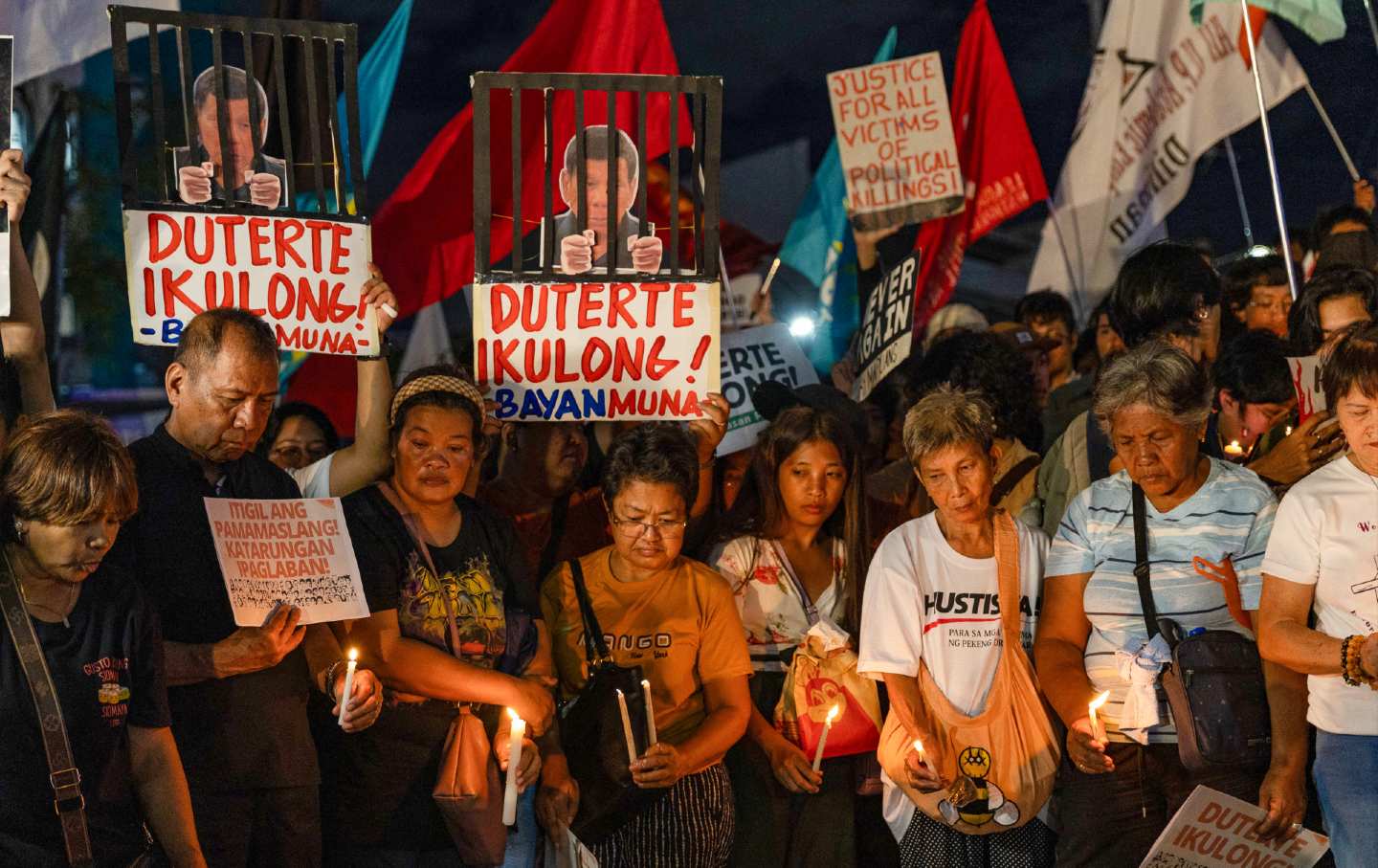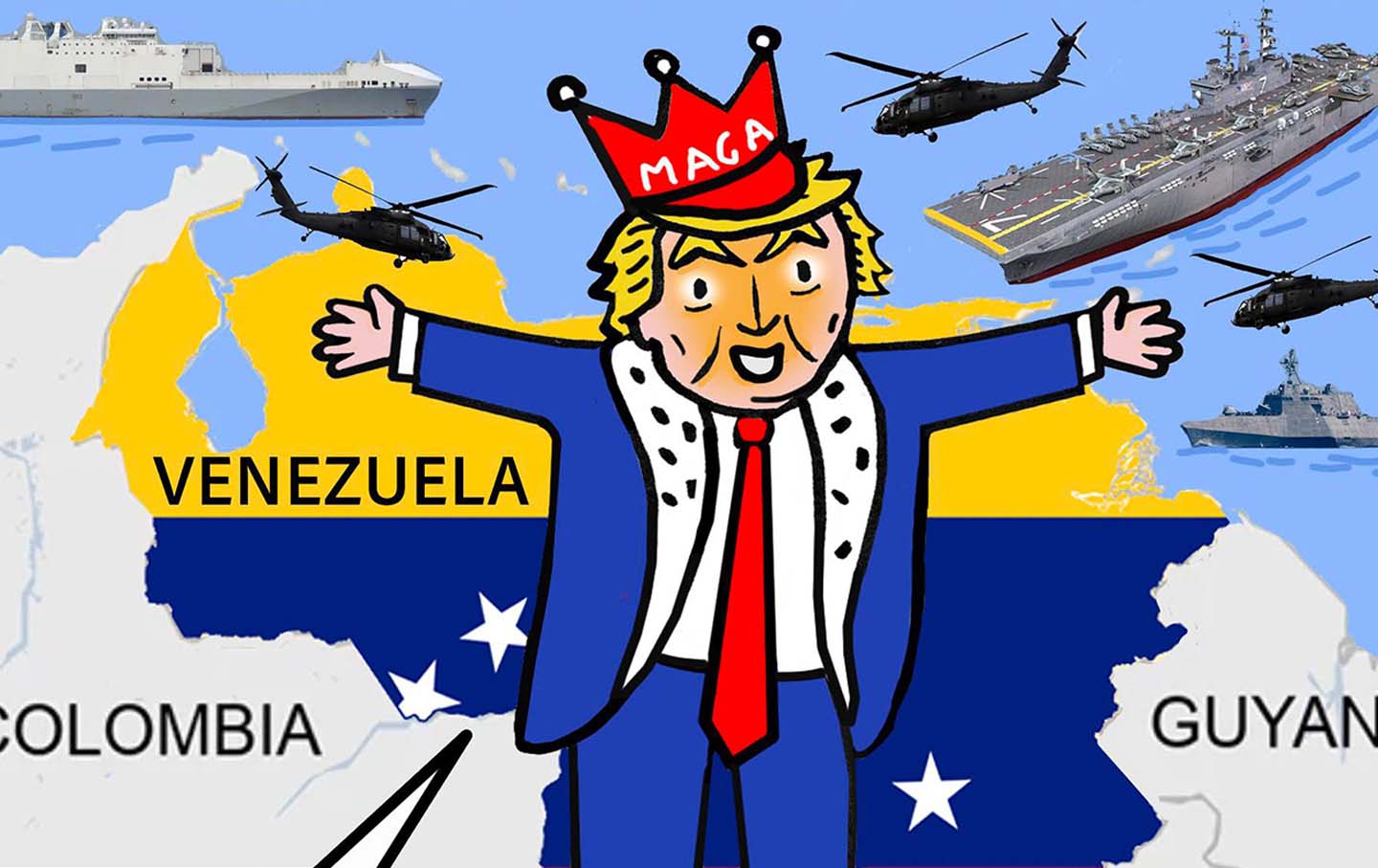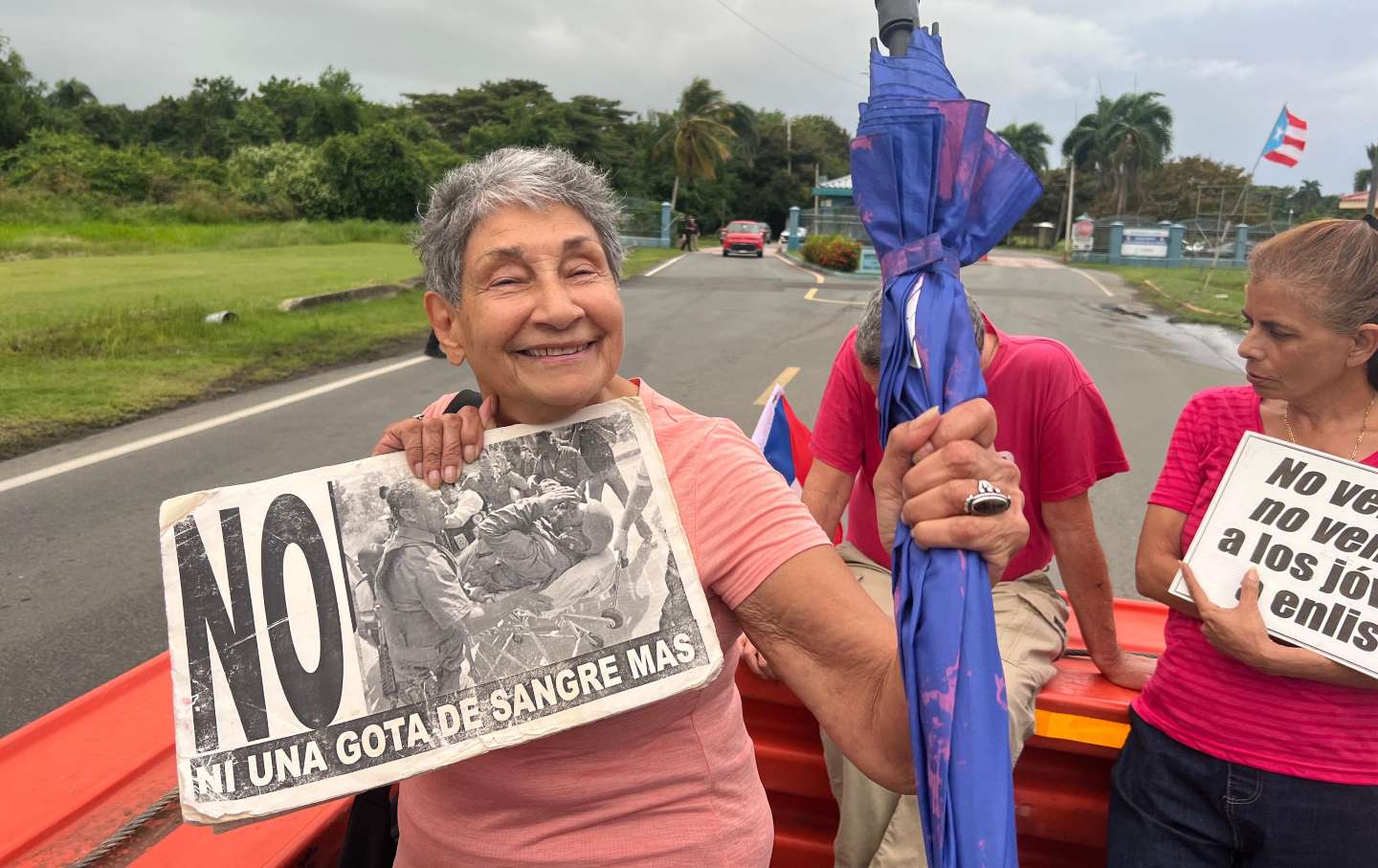Rodrigo Duterte Used the Philippines’ US-Made Constitution Against Itself
The autocratic spectacle of Duterte’s presidency should be a warning to the United States.

Protesters hold a candlelight vigil demanding justice for drug war victims, after the arrest of former Philippine president Rodrigo Duterte, in Quezon City on March 11, 2025.
(Earvin Perias / AFP via Getty Images)The photos accompanying reports of Rodrigo Duterte’s arrest were anticlimactic: The image of the lone, sleek silhouette of a chartered Learjet on the Villamor Air Base tarmac in Manila, windows lit from within, belied a nation and diaspora’s celebration and relief at the former Philippine president’s departure for The Hague. Charged by the International Criminal Court with the “crime against humanity of murder, committed in the Philippines between 1 November 2011 and 16 March 2019,” Duterte had a long path from politics to prison. The ex-president’s War on Drugs involved the extrajudicial killings of somewhere between 6,000 and more than 12,000 people, mostly urban working-class and poor, according to human rights organizations. Most of the dead were described by police as “drug suspects”; all were deprived of due process as enshrined in the post–Marcos regime 1987 Philippine Constitution.
The ICC’s arrest of Duterte comes after the October 2024 Philippine Senate hearings, in which Duterte freely took responsibility for the extrajudicial killings, offering “no apologies, no excuses.” While he stopped short of admitting that he ordered the Philippine National Police to carry out the killings, the ex-president acknowledged instructing police chiefs to allow suspects to fight back, giving them justification to kill under the excuse of self-defense. He has also encouraged vigilantes to act on his behalf, instructing them to kill drug dealers and users on sight. Reports of mistaken identification and planted evidence were rife; many victims were killed execution-style.
The impunity with which Duterte operated—and continues to operate, releasing a video before his departure in which he questioned what crime it was he had committed—is rooted in a political career founded on violence, mafioso tactics, and strongman populism. As mayor of Davao, a city in the southern Philippines, Duterte ruled as an autocrat, hiring a seven person-strong death squad—men he called “gangsters”—to rid the streets of alleged, but never charged, drug dealers and criminals. During his 22 years as mayor, human rights organizations say that he was responsible for at least 1,000 killings; in 2016, he told the BBC that he shot three men himself during that time. Riding his regional popularity, Duterte utilized a potent combination of anti-colonial nationalism, unfiltered rude-uncle authenticity, and his city’s neoliberal economic growth and “anti-drugs” record to national fame and, ultimately, to a landslide-won presidency in 2016.
How did Duterte get away with it for all of his six years as president? The Philippine government—its Constitution, its three branches of government—was structured by and in the image of the United States, which was one of its territories for 48 years, with a gap during World War II due to Japanese occupation. Theoretically, the Philippines’s system of checks and balances should have halted the unconstitutional War on Drugs; in reality, the system had been overrun before, by the Marcos regime.
To consolidate power, Duterte implemented a multipronged assault on Philippine democracy. He used the country’s Constitution to dismantle checks and balances, citizens’ rights, and the rule of law, all while enjoying a populist and personality-based high approval rating amongst Filipinos, many of whom had tired of politicians from the old metropolitan elite.
First, he strengthened his grip on the legislative branch: With the House of Representatives filled with political allies, Duterte capitalized on the initial popularity of his War on Drugs. In 2019, more of his allies won in the midterm Senate elections, giving him control over Congress.
Second, through this newly acquired power, Duterte moved on to controlling the Philippine judiciary, particularly the Supreme Court. Maria Lourdes Serrano, the chief justice, had strongly opposed Duterte’s circumvention of due process through extrajudicial killings. By 2018—under threat by the House of Representatives, which has the power to oust them all—the Supreme Court voted to remove Serrano under the flimsy accusation that she had failed to disclose her wealth, an alleged violation of the 1987 Constitution’s Article 9, which allows for the removal of Supreme Court justices should they be found guilty of “treason, bribery, graft and corruption, other high crimes, or betrayal of public trust.” Removals like Serrano’s chilled the judiciary’s appetite for criticizing or curbing Duterte’s extrajudicial killings.
Finally, with Congress and the judiciary under his sway, Duterte attacked press freedoms. Calling a free press “a privilege, not a right” (in direct defiance of the country’s Constitution), he refused to renew the license of the nation’s largest news broadcast network, ABS-CBN, forcing it off the air; used the Philippine Army to wage denial-of-service attacks on news websites and media organizations; arrested Maria Ressa, a Nobel Prize–winning investigative journalist and the founder of Philippine news platform Rappler, convicting her and her cofounder of cyber libel; and sanctioned the killing of journalists. “Just because you’re a journalist, you are not exempted from assassination,” Duterte said during a press conference in May 2016. By 2021, the Philippines had plummeted to a ranking of 138th out of 180 countries in press freedoms, according to Reporters Without Borders.
The near-absolute power with which Duterte allegedly carried out thousands of killings is not without precedent in the Philippines. During Ferdinand Marcos’s presidency-turned-regime from 1965 to 1986, 3,257 people are known to have been extrajudicially killed. As soon as Marcos declared martial law in 1972, more than 50,000 dissidents were tortured and incarcerated without due process. All of this happened under the eye of the United States, which wanted the Philippines to remain a regional anti-Communist ally and thus supported Marcos until he was overthrown by popular rebellion and flown to Hawaii on a US Air Force transport plane.
To this day, less than half of the $10 billion of stolen Philippine government money has been recovered. It is ironic that Duterte’s downfall comes at the hands of allies of the current president: Ferdinand “Bongbong” Marcos Jr., the son of the former dictator. The now-Marcos-controlled House of Representatives is also working to impeach his vice president, Sara Duterte, Rodrigo Duterte’s daughter, the end of a fraught and rivalrous partnership of convenience.
Filipinos across the global diaspora and at home have expressed relief at Duterte’s ICC arrest; still, many of his supporters remain loyal, scorning what they view as the Western overreach of power into Philippine autonomy, a common Duterte talking point and tactic. “I am the president of a sovereign state. And we have long ceased to be a colony. I do not have any master except the Filipino people,” he said in 2016, in a press conference ahead of a meeting with President Barack Obama. (In that same conference, he called the US president “a son of a whore”; Obama then canceled the meeting.)
One wonders: If such autocratic machinations are possible in the Philippines, a nation with a Constitution and a system of checks and balances composed of an independent judiciary and a bicameral legislature—a government shaped in the image of the United States just after the era of Boss Tweed and during Gilded Age corruption—could the same thing happen in the United States? The answer, of course, is that early stages of autocracy are already in motion.
Popular
“swipe left below to view more authors”Swipe →With each executive order, President Donald Trump may overwhelm American checks and balances faster than the system can respond. The Supreme Court is stacked with Trump appointees and lifelong conservatives; Congress, whose two houses are under Republican control, stands by in support. The breach of civilian rights has begun to pick up alarming speed: This past week, the warrantless arrest and detention of Columbia student and lawful permanent US resident Mahmoud Khalil spotlights the administration’s crushing of the First, Fifth, and Sixth amendments to the Constitution. The revocation of green cards and extrajudicial detention has precedent and is a power broadly given to the US government under anti-terrorism laws; still, the brazenness of this particular arrest and disappearance of Khalil feels different, like an opening gambit for further arrests of opponents of the Trump administration. Press secretary Karoline Leavitt confirmed on March 11 that Khalil’s detention was due to his opposition “to the foreign policy and national security interests of the United States of America,” a clear contravention of First Amendment rights, which does not differentiate based on immigration status. As of this writing, criminal charges are yet to be made.
It is easy to give in to the temptation of complacency, to look back at the first Trump presidency and perhaps hope that, like the last time, this will only last four years, that the system will right itself. As a person born in the final years of the Marcos regime and whose family suffered under the dictatorship, I am not so optimistic. The grasp of autocracy doesn’t always feel tight; it is achieved through a thousand small squeezes and the giving in of a bewildered, tired, and inattentive populace. Three years after his presidency’s end, Rodrigo Duterte’s arrest and coming trial in The Hague is laudable, particularly given that ICC arrest warrants for Russian President Vladimir Putin, Israeli Prime Minister Benjamin Netanyahu, and Sudanese former president Omar al-Bashir remain outstanding. His arrest, however, cannot compensate for the deaths of thousands of citizens; nor is it outpacing the rightward march of world leadership. The Philippines, as a nation whose government was formed in the image of the United States, is something of a canary in the coal mine, a cautionary tale that Americans may wish to heed.
More from The Nation

This Is Not Solidarity. It Is Predation. This Is Not Solidarity. It Is Predation.
The Iranian people are caught between severe domestic repression and external powers that exploit their suffering.

The Week of Colonial Fever Dreams From a Sundowning Fascist The Week of Colonial Fever Dreams From a Sundowning Fascist
The news was a firehose of stories of authoritarian behavior. We can’t let ourselves drown.

Self-Appointed King of Venezuela Self-Appointed King of Venezuela
The United States attacks Venezuela and captures President Maduro. Trump claims that the US will “run” the country for oil interests.

Puerto Rico’s Mothers Against War Turn to Revolutionary Love Puerto Rico’s Mothers Against War Turn to Revolutionary Love
Formed to oppose the Iraq War, Madres Contra La Guerra have now spent decades trying to end Puerto Rico’s role at the center of the US war machine in Latin America.

How a French City Kept Its Soccer Team Working Class How a French City Kept Its Soccer Team Working Class
Olympique de Marseille shows that if fans organize, a team can fight racism, keep its matches affordable, and maintain a deep connection to the city.



